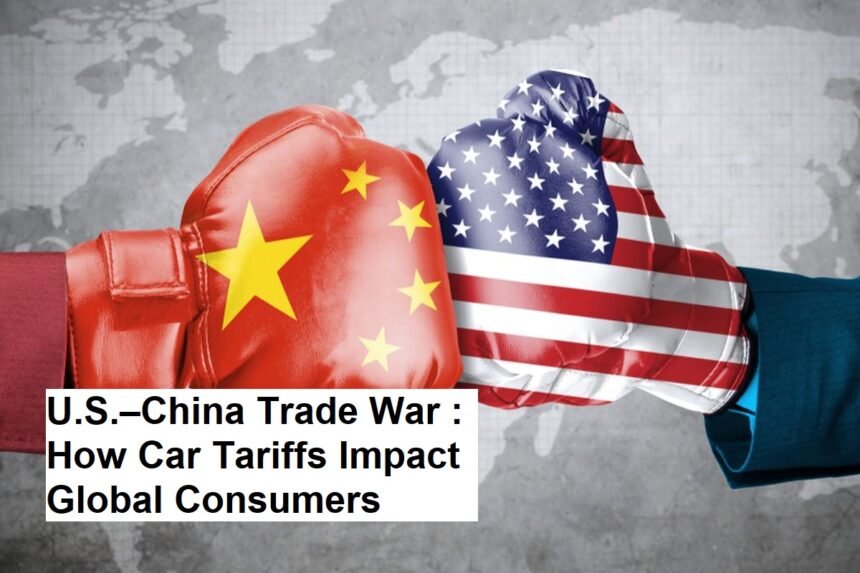Introduction: Why Car Tariffs Matter in the Trade War
When we talk about the U.S.–China trade war car tariffs, most people think of big political battles and billion-dollar losses. But the truth is, these tariffs have a direct effect on everyday drivers, car buyers, and even auto industry workers across the globe.
From higher prices to limited model availability, the impact of import tariffs on vehicles and industrial protection policies is real—and understanding these dynamics can help you make smarter buying and investing decisions.
The Trade War Explained in Simple Terms
What Sparked the U.S.–China Trade War?
The conflict began in 2018 when Washington accused Beijing of unfair trade practices, including intellectual property theft and heavy state subsidies. In response, the U.S. imposed tariffs on Chinese goods, and China retaliated with its own tariffs on American products—including cars.
Why Automobiles Are a Big Deal
Cars are high-value goods, and the auto sector employs millions worldwide. By targeting automobiles, both governments added pressure to one of the most visible industries in global trade.
💡 Tip for readers: If you’re a consumer, remember that tariffs don’t hurt governments directly—they trickle down into higher costs for you at the dealership.
How Car Tariffs Work
The Basics of Import Duties
An import tariff is simply a tax applied to goods coming into a country. For cars:
- If the U.S. imports a vehicle from China, an additional duty is charged.
- If China imports a vehicle from the U.S., the same applies.
These tariffs make foreign cars more expensive, often pushing buyers toward domestic alternatives.
Why Governments Use Them
- Industrial protection: To protect local automakers from cheaper foreign competition.
- Political leverage: Tariffs become bargaining chips in wider negotiations.
- Revenue generation: They add money to government budgets, though usually at the expense of consumers.
💡 Tip for readers: If you’re shopping for an imported car, check the latest tariff policies—they can raise sticker prices overnight.
The Consumer Impact: More Than Just Higher Prices
Direct Effects
- Car prices rise: A 25% tariff can add thousands of dollars to the final price tag.
- Fewer choices: Automakers may avoid exporting certain models if tariffs make them uncompetitive.
- Delayed launches: Some global models reach markets slower because of uncertainty in tariff rules.
Indirect Effects
- Higher financing costs: As car prices rise, loan amounts go up.
- Used car market boom: Shoppers turn to second-hand vehicles when new imports get too pricey.
- Supply chain issues: Auto parts often cross borders multiple times, so tariffs increase costs at every step.
💡 Tip for readers: If new car prices look steep, explore certified pre-owned vehicles. They’re less affected by trade wars.
The Geopolitics of Automobiles
The geopolitics of the auto industry goes beyond U.S.–China rivalry. Car tariffs reshape global alliances and trade flows.
New Trade Routes Emerging
- Europe steps in: EU automakers may gain market share in China if U.S. vehicles become too expensive.
- Southeast Asia’s rise: Countries like Vietnam and Thailand are becoming alternative hubs for auto production.
- Mexico’s opportunity: Thanks to proximity and trade deals, Mexico may benefit if U.S. companies avoid Chinese manufacturing.
💡 Tip for readers: Investors should monitor which regions are becoming new automotive hubs—this signals future stock growth opportunities.
Industrial Protection Policies: Short-Term Gain, Long-Term Pain?
Governments love industrial protection policies because they create jobs at home and protect local players. But there’s a trade-off.
The Pros
- Boosts domestic car production.
- Safeguards local jobs.
- Encourages innovation in local markets.
The Cons
- Reduces global competition, which can slow down innovation.
- Raises costs for consumers.
- Risks retaliation from trading partners, escalating trade wars.
💡 Tip for readers: If you’re a business owner in the auto supply chain, diversify your sourcing—you don’t want to be caught in tariff crossfire.
Global Ripple Effects of the U.S.–China Car Tariffs
This isn’t just about two countries. Because the auto industry is deeply globalized, tariffs in one market create shockwaves elsewhere.
- Japanese automakers: Toyota and Honda face higher costs when exporting parts assembled in China.
- European automakers: BMW and Mercedes have U.S.-based factories exporting to China—tariffs hurt their sales.
- Emerging markets: Countries dependent on affordable cars feel the pinch as tariffs push up global price levels.
💡 Tip for readers: Follow global auto news even if you live outside the U.S. or China—the ripple effects may hit your local dealership.
The Road Ahead: What Consumers Can Expect
The future of the U.S.–China trade war car tariffs depends heavily on political negotiations.
Best-Case Scenario
- Tariffs ease, global supply chains normalize, and car prices stabilize.
Worst-Case Scenario
- More tariffs on EVs and batteries, making sustainable transportation costlier.
Most Likely Scenario
- Ongoing uncertainty, with tariffs fluctuating as leverage in broader trade disputes.
💡 Tip for readers: If you’re planning a car purchase, act during tariff “truce periods.” Prices tend to drop when negotiations temporarily ease.
Conclusion: Tariffs Are About Politics, But Consumers Pay the Price
The U.S.–China trade war car tariffs show how politics and economics collide in ways that affect everyday life. From import vehicle tariffs to industrial protection policies and the geopolitics of automobiles, this battle is reshaping the global auto market.
For consumers, the key is staying informed. Whether you’re buying a car, investing in auto stocks, or running a business in the supply chain, trade policies directly shape your costs and opportunities.
What’s your take on the U.S.–China car tariff war? Do you think tariffs are necessary to protect local industries, or are they hurting consumers more than helping? Drop your thoughts in the comments—I’d love to hear your perspective!












